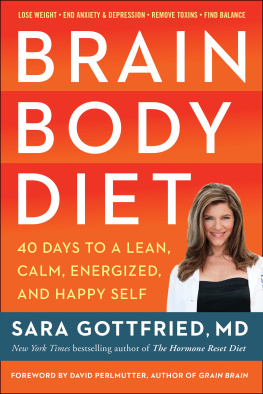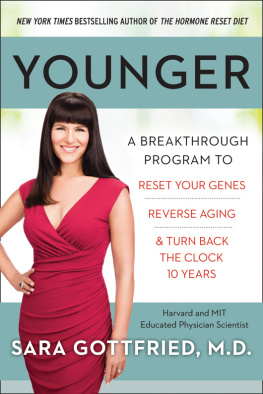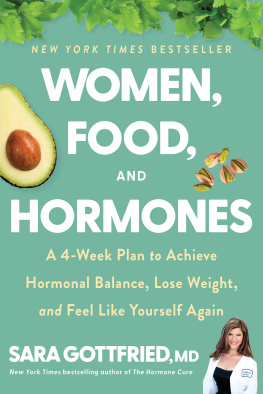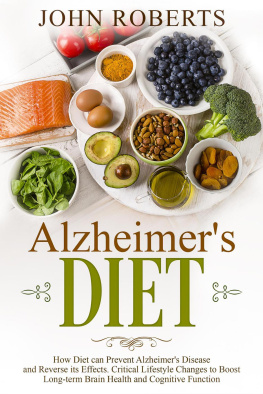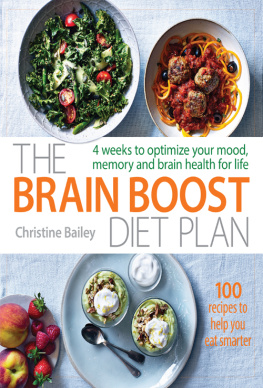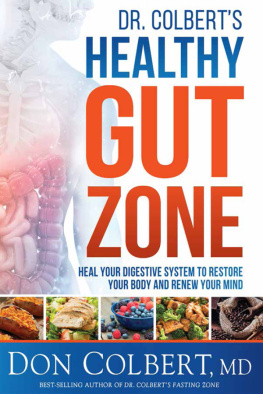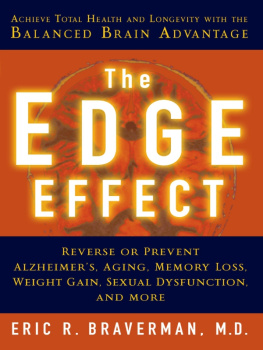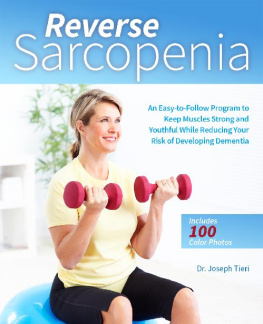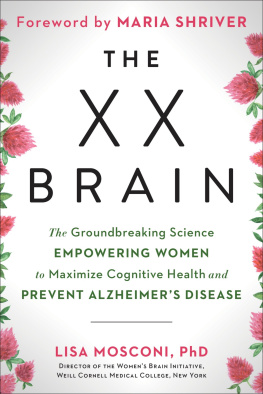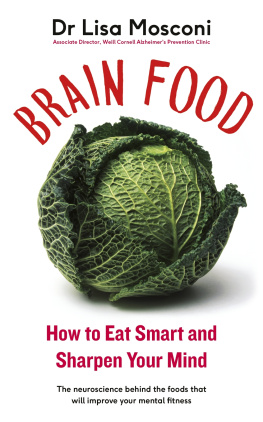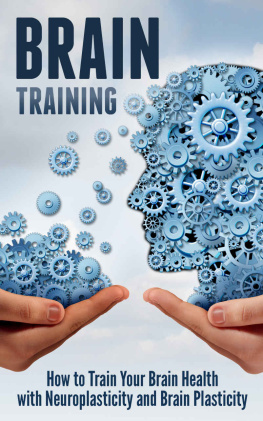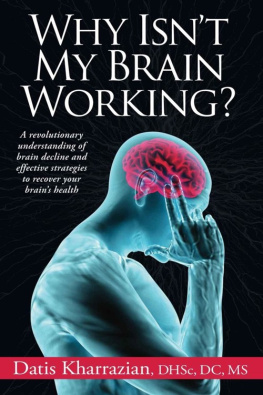This book contains advice and information relating to health care. It should be used to supplement rather than replace the advice of your doctor or another trained health professional. If you know or suspect you have a health problem, it is recommended that you seek your physicians advice before embarking on any medical program or treatment. All efforts have been made to assure the accuracy of the information contained in this book as of the date of publication. This publisher and the author disclaim liability for any medical outcomes that may occur as a result of applying the methods suggested in this book.
BRAIN BODY DIET . Copyright 2019 by Sara Gottfried, MD. All rights reserved under International and Pan-American Copyright Conventions. By payment of the required fees, you have been granted the nonexclusive, nontransferable right to access and read the text of this e-book on-screen. No part of this text may be reproduced, transmitted, downloaded, decompiled, reverse-engineered, or stored in or introduced into any information storage and retrieval system, in any form or by any means, whether electronic or mechanical, now known or hereafter invented, without the express written permission of HarperCollins e-books.
Cover design: HarperCollins
Illustrations by Sara Gottfried, MD; Kevin Plottner; and Lisette Picasso
FIRST EDITION
Library of Congress Cataloging-in-Publication Data
Names: Gottfried, Sara, author.
Title: Brain body diet : 40 days to a lean, calm, energized, and happy self / Sara Gottfried.
Description: First edition. | New York, NY : HarperOne, [2019] | Includes index.
Identifiers: LCCN 2018039830 (print) | LCCN 2018056505 (ebook) | ISBN 9780062655974 (e-book) | ISBN 9780062655950 (hardcover) | ISBN 9780062655967 (pbk.)
Subjects: LCSH: Holistic medicine. | Mind and body.
Classification: LCC R733 (ebook) | LCC R733 .G77 2019 (print) | DDC 610dc23
LC record available at https://lccn.loc.gov/2018039830
Digital Edition MARCH 2019 ISBN: 978-0-06-265597-4
Version 03152019
Print ISBN: 978-0-06-265595-0
Dedicated to my daughters,
who inspire me to transform medicine
and make the world a better place
Contents
One of the most exciting developments in the area of health and wellness over the past decade has been the recognition that gaining an understanding of a persons uniqueness opens the door to far more effective strategies for management of disease risk and treatment as well as health preservation and enhancement.
This empowering perspective has been termed personalized medicine, and it incorporates a vast array of information sets including genetics, standard laboratory assessments, and even information gleaned from studies of a persons gut bacteria to ultimately tailor a dedicated and specific program for the individual.
Theres no doubt that this evolving approach holds great promise toward the goals of more efficient and effective health care. And moving forward, the value of incorporating a more personalized approach to the practice of medicine will gain more widespread recognition and implementation.
Standing in contrast to personalized medicine is the one size fits all theme that almost fully underlies the practice of medicine in the Western world. This approach values understanding the disease a person gets far more than understanding the person who gets the disease. It is a system that doesnt fully differentiate diagnostic and therapeutic techniques that represent standard of care, for example, when comparing men and women. Children, as seen in this paradigm, are merely small adults.
To be sure, womens health as a medical specialty has clearly become well, if not somewhat narrowly, defined. Typically, the term embraces those issues unique to women and overwhelmingly focuses on the reproductive process. More recently, there has been recognition that while rates for conditions like cardiovascular disease, cancer, and lung disease are similar between men and women, the disease course and response to treatment may vary considerably. These observations have helped to broaden the understanding of the uniqueness of womens health well beyond reproduction and sexuality.
Clearly, however, there remains a paucity of acceptance that significant differences exist when comparing the brains of men and women in terms of function, disease risk, and response to treatment. Why this lack of recognition and its acceptance remain pervasive is beyond the scope of this foreword, but its certainly not a consequence of inadequate scientific support. Decades of research clearly demonstrate that females are at less risk for a variety of brain disorders including autism, attention deficit/hyperactivity disorder (ADHD), Tourette syndrome, and dyslexia, but have higher risk for multiple sclerosis, depression, anxiety disorder, and anorexia nervosa. Indeed, a womans risk for Alzheimers disease, a disease for which there exists no meaningful treatment whatsoever, is double that of a mans, a statistic that receives precious little mention in the media.
There are a multitude of factors at play that contribute to the brains gender differences, many of which are influential during development. These include fundamental female/male genetic differences as well as variability in terms of how hormonal and environmental influences are operant depending on gender. Hormonal and environmental influences have a direct bearing on brain development as well as secondary effects through the mechanism of altering gene expression.
These and other mechanisms, and their unique gender-related manifestations, persist throughout our lifetimes and impart measurable differences in the brains of women in comparison to men in terms of structure as measured by sophisticated imaging technology. How these physical differences influence physiology, function, and behavior is central to an emerging body of research.
But despite a full understanding of these mechanisms, many important brain-related issues that challenge women are remarkably responsive to modification of lifestyle choices.
In the pages that follow, Dr. Sara Gottfried unpacks the science that clearly supports the heretofore politically incorrect notion that mens and womens brains are different. She deftly explores how these differences manifest in many of the pervasive issues that plague modern women including forgetfulness, weight gain, addiction, depression, anxiety, and exhaustion, and how fundamental the brain/body connection is to overall health and well-being. This connection between brain and body is further explored in the context of conditions like digestive disorders, fluid retention, and chemical sensitivity.
But the true blessing of this work is the actionable plan that builds on this science and paves the way for recovering optimal health. The Brain Body Protocol that Gottfried has created provides a powerful, user-friendly program allowing readers the opportunity to leverage the knowledge Dr. Gottfried presents to bring about a long-awaited, positive change in health destinyfor all women.
David Perlmutter, MD, FACN, ABIHM
May 2018
Naples, Florida
Most of us dont really pay attention to our bodies. We exist solely from our heads, ignoring the rest. Thats the way smart women are taught to survive, but this way of living isnt healthy long-term. Despite my training as a medical doctor, I had to learn that the hard way. When I was forced to confront my own health crisis, I discovered that what we know about improving and changing our bodies is incomplete. Now Im here to teach you how to make the crucial connection between your body and your brain that will help you thrive. Ill explain how your vague lack of well-being is linked to a weak brain/body bondand how it can be fixed, starting first with food.

